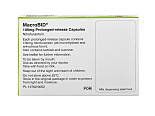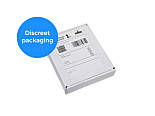Nitrofurantoin
Use nitrofurantoin 100mg to treat your urinary tract infection in 3 days. Nitrofurantoin is an effective antibiotic you can request from Asda Online Doctor.








Prices from £21.90
In stock. Simply fill in a brief questionnaire. One of our doctors will review your order and prescribe a suitable treatment. How to Order
-
Nitrofurantoin is an antibiotic used to treat urinary tract infections (UTIs), such as cystitis. Each nitrofurantoin capsule contains 100mg of the active ingredient nitrofurantoin. The usual dose for cystitis is one 100mg capsule, twice per day, for 3 days. You can find out more about nitrofurantoin in your patient information leaflet.
* Please note that generic medication may be prescribed which does not match the images shown.




About nitrofurantoin
-
-
Nitrofurantoin is an antibiotic that contains the active ingredient nitrofurantoin. It used to be available under the brand name Macrobid, but this is no longer available. You can use nitrofurantoin to help clear bladder infections caused by bacteria, such as cystitis. Cystitis is a common lower urinary tract infection (UTI) that can cause:
- pain in the tummy
- an urgency to pee,
- the need to pee more frequently
If you’re not sure whether you’ve got cystitis we’ve created a guide on the 5 signs to look out for and when to get treatment. You can also take nitrofurantoin to prevent cystitis if it keeps coming back. This is known as recurrent cystitis. We cannot prescribe nitrofurantoin for recurrent cystitis but your GP can.
If nitrofurantoin doesn’t clear up cystitis after 3 days, you’ll need to speak to a doctor for advice on what to do next.
-
-
As an antibiotic, nitrofurantoin works by killing harmful bacteria in your bladder area. The active ingredient enters bacteria cells and damages their genetic material, killing them and preventing further reproduction. This stops the burning sensation you have when you pee, and prevents your cystitis infection from getting worse.
When you take nitrofurantoin capsules, the medication is filtered out of your blood into your urine. This means it treats UTIs effectively, as it’s concentrated in the area of infection (your bladder). You should start to feel better within 2-3 days. The sooner you use nitrofurantoin, the faster you can get back to your normal daily activities.
-
-
Nitrofurantoin is available in 2 doses: 50mg and 100mg. Asda Online Doctor only prescribes nitrofurantoin 100mg capsules.
-
-
Nitrofurantoin is suitable for most adults, as long as you’re not allergic to any ingredients in the capsules. Nitrofurantoin is not suitable for you if you’ve got the following medical conditions:
- anaemia
- B12 or folate deficiency
- peripheral neuropathy
- kidney or liver impairment
- porphyria
- G6PD (glucose-6-phosphate dehydrogenase) deficiency
This is because these conditions may increase the risk of adverse effects while taking nitrofurantoin tablets, which can be serious. Nitrofurantoin also contains lactose which some people cannot take.
You should speak to your GP if you have recurrent cystitis, as you may need preventative treatment to stop it from coming back. Our doctors will let you know if nitrofurantoin is suitable for you when prescribing it.
You should not take nitrofurantoin if you:
- have an allergy to any ingredients in the capsules
- have severe kidney problems
- are in the final stages of pregnancy (labour or delivery) – there’s a risk that nitrofurantoin can affect your baby
- have porphyria (a blood disorder)
- are breastfeeding a baby with suspected or known G6PD deficiency
-
-
The usual treatment dose for nitrofurantoin antibiotics is: one 100mg capsule, twice a day, for 3 days. You should always take nitrofurantoin as prescribed by your doctor. Each nitrofurantoin capsule should be swallowed whole, with a glass of water. Don’t crush or chew the capsules.
Try to leave around 12 hours between each dose, such as taking it at 8am and 8pm. Take nitrofurantoin with a meal or snack, as this can help your body to absorb the medication and prevent stomach upset.
When should I start taking nitrofurantoin?
You should start taking nitrofurantoin as soon as you receive your treatment. The sooner you start taking it, the sooner your infection will clear and the better you’ll feel. If you’re taking nitrofurantoin to prevent cystitis, your doctor will tell you when you should take it and for how long (usually several months).
You can also take nitrofurantoin to prevent cystitis when having surgery. Asda Online Doctor can only prescribe nitrofurantoin for current infections.
What should I do if I forget to take nitrofurantoin?
- If you forget to take nitrofurantoin and it’s the same day your dose was due, take it as soon as you remember and then carry on your treatment as normal. If it’s about time your next dose is due, don’t take the missed dose. Never take a double dose to make up for a missed one, this won’t increase the effectiveness but might cause side effects.
- If you forget to take a dose and it’s the next day, skip the missed dose and carry on your treatment as normal. You should still finish your treatment course.
- If you miss multiple doses, speak to your doctor. This could make nitrofurantoin less effective and may cause your cystitis infection to come back.
What should I do if I take too much nitrofurantoin?
If you take more nitrofurantoin than you’ve been prescribed, this could increase the risk of side effects. Speak to your doctor or a pharmacist straight away if you notice any side effects, or go to A&E if you get any serious side effects. Take your nitrofurantoin packet with you.
What should I do if I want to stop taking nitrofurantoin?
You should keep taking nitrofurantoin, even if you feel better within a few days. Stopping nitrofurantoin early could cause your cystitis infection to come back. If for any reason you cannot keep taking nitrofurantoin, speak to your doctor straight away.
What if my symptoms don’t get better?
If your symptoms haven’t gotten better within 3 days, speak to your doctor. You may need a different cystitis treatment.
-
-
Nitrofurantoin and pregnancy: Nitrofurantoin can be taken in pregnancy, but only under the supervision of your doctor. It cannot be taken if you’re about to be or are in labour (or delivery) as taking it during this stage can affect your baby. If you’re worried about this, speak to your doctor. If you go into early labour and are taking nitrofurantoin, you should let your midwife know straight away.
Nitrofurantoin and breastfeeding: You can take nitrofurantoin while breastfeeding but you should get advice from your doctor first. It’s not safe to breastfeed a child with suspected or known G6PD deficiency if you’re taking nitrofurantoin.
-
-
You should speak to your doctor before taking nitrofurantoin if you have:
- diabetes
- any illness that causes severe weakness
- anaemia
- vitamin B deficiency
- abnormal levels of salt in your blood
- a history of allergic reactions
- kidney problems
- any disease of the lungs – this medicine can cause lung disease in patients with no previous medical history of lung problems. Talk to your doctor straight away if you have difficulty breathing, shortness of breath, a cough, pain or discomfort when breathing, or you’re coughing up blood or mucus.
- a disease of the liver or nervous system – your doctor may need to monitor you regularly, especially if you need nitrofurantoin often
Nitrofurantoin can cause dizziness and drowsiness in some people. Don’t drive or operate machinery if you get these symptoms until you feel better.
Generic nitrofurantoin tablets may contain different non-active ingredients depending on the manufacturer, so always check your patient information leaflet or with your doctor.
-
-
Like all medicines, nitrofurantoin can cause some side effects although not everyone will get them. Most side effects of nitrofurantoin are mild and go away once you finish your treatment course. If you get any side effects, speak to your doctor.
While taking nitrofurantoin you may get brown or dark yellow urine. This is completely normal, so there’s no need to stop taking it.
Nitrofurantoin can cause some serious side effects which need immediate medical attention. Stop taking nitrofurantoin straight away and call 999 or go to A&E if you notice any of the following:
- a serious allergic reaction (anaphylaxis) – symptoms include difficulty breathing, sudden wheezing, swelling in the face, throat or eyelids, and a rash or itching
- lung problems, which may include pneumonia or damage to the tissue – symptoms include fever, chills, cough, or shortness of breath
- jaundice (inflamed liver) – symptoms include yellowing of the skin and the whites of the eyes, fever, chills, flu-like symptoms, and itching of the skin
- a severe reduction in blood cells – symptoms include weakness, bruising, or developing further infections
- cyanosis (low oxygen levels) – symptoms include blue or purple coloration of the skin
- cutaneous vasculitis (inflammation of blood vessels in the skin) – symptoms include fever, flu, stomach pain, diarrhoea, weakness, and blood in your stool
- hepatitis – symptoms include fatigue, joint pain, swelling, and stomach pain
Rare nitrofurantoin side effects include:
- loss of consciousness
- damage to bone marrow which can cause a deficiency in red blood cells (anaemia)
Other nitrofurantoin side effects (frequency not known) include:
- feeling sick (nausea) and being sick (vomiting)
- headache
- loose stools
- loss of appetite
- stomach ache
- dizziness
- drowsiness
- a change in blood cells, which can cause bruising, sore throat, fever, or anaemia
- affected nerves outside the spinal cord, which can cause changes to the sense of feeling, muscle weakness, headache, extreme changes in mood or mental state, confusion, and blurred vision – these effects may be severe and in some cases permanent
- skin rashes or reactions ranging from mild to severe
- short-term hair loss
- increased pressure in the skull which causes severe headaches
- UTI caused by germs not sensitive to nitrofurantoin
- inflammation of small blood vessel walls, causing skin lesions
- liver inflammation
- inflammation of the kidney tissue
Any serious or bothersome side effects of nitrofurantoin should be reported straight away. Mild side effects, such as nausea or headaches, can be treated at home with painkillers, rest, and plenty of liquids.
-
-
Nitrofurantoin can interact with certain medications, including prescription, herbal, and over the counter treatments. You should let your doctor know if you’ve taken any medications recently, or are currently taking any, especially:
- gout treatments
- antacids for indigestion
- glaucoma medications, such as carbonic anhydrase inhibitors (like acetazolamide)
- medicines that can make your urine less acidic, such as potassium citrate mixtures
- medicines to treat infections called quinolones
- the typhoid vaccine
-
-
You can eat and drink normally while taking nitrofurantoin. Make sure to take your nitrofurantoin capsule with food, as this can reduce stomach upset. You can also drink alcohol while taking nitrofurantoin, although this may increase the risk of some side effects. It’s best to avoid it if you get headaches, nausea, or stomach pain.
-
-
The active ingredient in nitrofurantoin tablets is always nitrofurantoin, whether this is branded or generic. For non-active ingredients, this depends on whether you’re taking branded or generic nitrofurantoin antibiotics. You can find out all the non-active ingredients for your tablets by checking the patient information leaflet.
-
-
According to national guidelines, the recommended cystitis treatment is nitrofurantoin. If this is unsuitable for you, a doctor can prescribe fosfomycin instead. Fosfomycin is an antibiotic and only 1 dose is typically needed. It comes in the form of a powder that needs to be mixed with water. The active ingredient is fosfomycin trometamol.
You can get nitrofurantoin online through our regulated online doctor service. Start by filling out a short questionnaire about your health and symptoms which will be reviewed by one of our doctors. If suitable, nitrofurantoin will be prescribed to you and sent to your chosen address. You can also choose Click & Collect at checkout and collect from your local Asda pharmacy.
-
-
How should I store nitrofurantoin?
Nitrofurantoin should be stored away from children and vulnerable adults. Don’t store above 25°C and keep your medication in the original packaging to protect from light and moisture. Don’t use nitrofurantoin after the expiry date.
How should nitrofurantoin be disposed of?
You can dispose of most medicines at your local pharmacy. Don’t throw away any unused medicine into your household waste. The empty packaging can be recycled at your local pharmacy if available.
What does nitrofurantoin look like?
Generic nitrofurantoin tablets may look different but you can check what your tablet is supposed to look like in the patient information leaflet.
-
Frequently asked questions
What is nitrofurantoin 100mg used for?
Nitrofurantoin 100mg is used for treating bladder infections, such as cystitis. It can also be used to prevent cystitis if you get it often or before surgery. Nitrofurantoin antibiotics work well for UTIs but aren’t used for other infections.
How long does nitrofurantoin 100mg take to work?
It takes a few days for nitrofurantoin to work properly.
What is the best time of day to take nitrofurantoin?
You can take nitrofurantoin at any time of day, but you must take it with food. Nitrofurantoin 100mg capsules are taken twice a day, so you might want to take it in the morning with breakfast and then again in the evening with dinner. Leave around 12 hours between doses.
Does nitrofurantoin make you tired?
Tiredness is not a listed side effect of nitrofurantoin but having a bladder infection may make you tired, or tiredness could be caused by other side effects. If you keep feeling tired while taking nitrofurantoin, report this to your doctor.
Can I drink alcohol on nitrofurantoin?
Alcohol doesn’t interact with nitrofurantoin but it's best to avoid drinking it until you’ve finished your treatment. Alcohol may make your cystitis symptoms worse, as it can make you need to urinate more frequently.
Can I take painkillers with nitrofurantoin?
You can take over-the-counter painkillers with nitrofurantoin, such as paracetamol and ibuprofen. For any prescription painkillers check with your doctor first.
Can you take nitrofurantoin on an empty stomach?
No, it’s not recommended to take nitrofurantoin on an empty stomach, as this can upset your stomach. Eating food with nitrofurantoin can also improve how well the medication absorbs.
Can I buy nitrofurantoin over-the-counter?
No, nitrofurantoin is a prescription-only medication, so it cannot be bought over the counter. There are several over-the-counter cystitis remedies, but these are for reducing side effects rather than for treating the infection.

Babak studied medicine at King’s College London and graduated in 2003, having also gained a bachelor’s degree in Physiology during his time there. He completed his general practice (GP) training in East London, where he worked for a number of years as a partner at a large inner-city GP practice. He completed the Royal College of GPs membership exam in 2007.
Meet our doctorsArticle created: 08 Oct 2021
Last reviewed: 08 May 2024
-
MacroBID 100mg Prolonged-released Capsules, EMC [accessed 22 April 2024]
-
Nitrofurantoin, NICE/BNF [accessed 22 April 2024]
-
Urinary tract infections, NICE/BNF [accessed 22 April 2024]
-
Nitrofurantoin, NHS [accessed 22 April 2024]
-
Cystitis, NHS [accessed 22 April 2024]


GMC: 7074021

GMC: 6149061

GMC: 7085115







